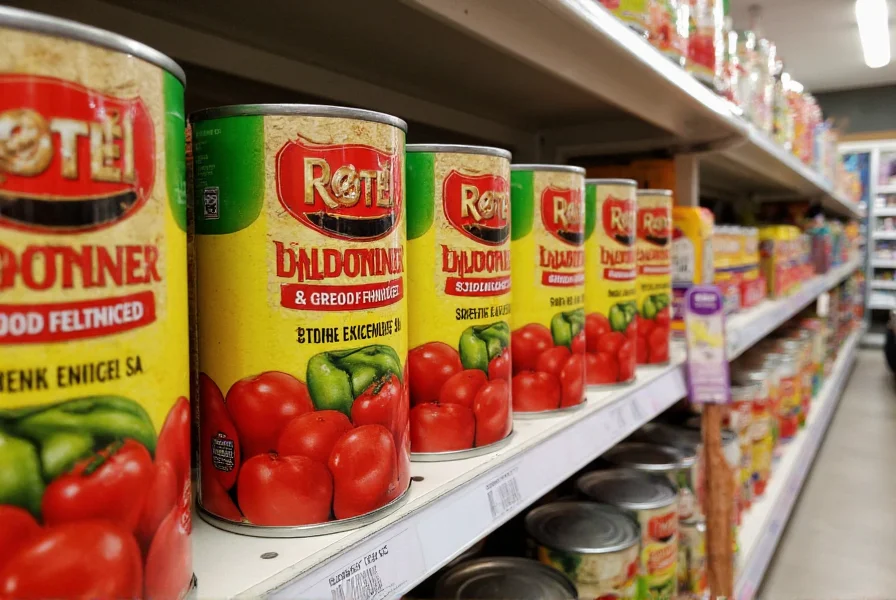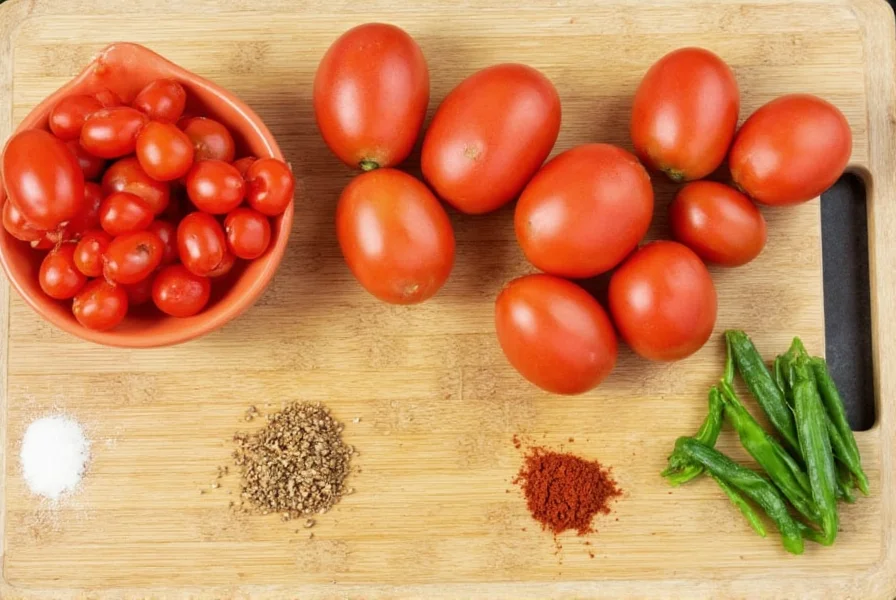Rotel chili isn't actually a specific chili variety but rather a popular canned product that has become synonymous with a particular flavor profile in American cooking. The original Rotel product—diced tomatoes with green chilies—has been a kitchen staple since 1942 when it was first created in Elsa, Texas. This versatile ingredient delivers consistent heat and tomato flavor without requiring fresh preparation.
What Exactly Is Rotel?
Rotel is a trademarked brand of canned tomatoes blended with green chilies, primarily jalapeños. The standard Rotel product contains:
- Vine-ripened tomatoes
- Green chilies (jalapeño peppers)
- Salt
- Calcium chloride (for firmness)
- Citric acid (for flavor and preservation)
The magic of Rotel lies in its balanced heat level. Unlike fresh jalapeños which can vary dramatically in spiciness, Rotel provides consistent mild-to-medium heat that works reliably in recipes. The tomatoes are diced to a uniform size that holds up well during cooking.

Rotel Product Varieties
While the original diced tomatoes with green chilies remains most popular, Rotel offers several variations to suit different cooking needs:
| Variety | Heat Level | Best Uses |
|---|---|---|
| Original Diced Tomatoes & Green Chilies | Mild | Queso, casseroles, soups |
| Hot Diced Tomatoes & Green Chilies | Medium-Hot | Tacos, chili, enchiladas |
| Tomato Basil with Italian Herbs | Mild | Pasta dishes, pizza sauce |
| Fire Roasted Diced Tomatoes | Mild | Salsas, roasted vegetable dishes |
How to Use Rotel in Cooking
Rotel's convenience makes it invaluable for weeknight cooking. Professional chefs and home cooks alike appreciate how this product delivers consistent flavor without prep time. When incorporating Rotel into recipes, remember these key principles:
- Drain excess liquid when making thicker dishes like queso or casseroles
- Add during the last 15-20 minutes of cooking to preserve fresh tomato flavor
- Combine with cream cheese for instant dip bases
- Use as a shortcut for homemade salsa
- Substitute for plain diced tomatoes when you want added heat
One of the most popular applications is Rotel cheese dip—simply combine one 10-ounce can of Rotel with 8 ounces of cream cheese and 1 cup of shredded cheddar. Bake at 350°F until bubbly (about 20 minutes) for a crowd-pleasing appetizer that requires minimal effort.
Perfect Rotel Substitutes
When you can't find Rotel or prefer homemade alternatives, these substitutions work well for different cooking scenarios:
- For mild heat: 1 can (14.5 oz) diced tomatoes + 1-2 minced jalapeños (seeds removed)
- For medium heat: 1 can diced tomatoes + 1-2 serrano peppers, finely chopped
- For smoky flavor: 1 can fire-roasted tomatoes + 1 chipotle pepper in adobo sauce
- For no-cook applications: Fresh pico de gallo with extra jalapeño
When making rotel chili substitute options, remember that canned products have consistent acidity levels important for food safety in canning. Homemade versions work best in cooked dishes rather than for canning or long-term storage.

Nutritional Profile of Rotel
Understanding rotel diced tomatoes with green chilies nutrition helps incorporate it into balanced meals. A 1/2 cup (123g) serving of original Rotel contains:
- 30 calories
- 0g fat
- 7g carbohydrates
- 2g fiber
- 1g protein
- 440mg sodium (19% of daily value)
- 20% of daily vitamin C
- 8% of daily vitamin A
The sodium content is higher than plain diced tomatoes due to the preservation process. For lower sodium options, look for Rotel's "No Salt Added" variety or drain and rinse regular Rotel before use. The capsaicin in the chilies provides metabolism-boosting properties while the lycopene in tomatoes offers antioxidant benefits.
Storage and Shelf Life
Unopened Rotel maintains quality for 18-24 months when stored in a cool, dry place. Once opened, transfer unused portions to an airtight container and refrigerate for up to 5 days. For longer storage, freeze portions in ice cube trays then transfer to freezer bags—this makes it easy to use just the amount needed for recipes like easy rotel cheese dip.
When checking for spoilage, look for:
- Bulging or leaking cans
- Discoloration (darkening beyond normal)
- Off smells when opened
- Mold growth
Popular Rotel Recipes Worth Trying
Rotel's versatility shines in these crowd-pleasing dishes that showcase what rotel tomatoes and green chilies uses beyond basic dips:
- Texas-Style Queso: Combine 1 can Rotel, 8 oz Velveeta, and 1/2 cup milk. Heat on low until smooth.
- Rotel Chicken Casserole: Mix 1 can Rotel, 2 cups shredded chicken, 1 cup corn, 1 cup broth, and 1 cup cheese. Bake at 375°F for 25 minutes.
- One-Pot Rotel Pasta: Cook 8 oz pasta with 1 can Rotel, 2 cups broth, and 1 lb Italian sausage until liquid is absorbed.
- Rotel Bloody Mary Mix: Blend 1 can Rotel, 4 cups tomato juice, 2 oz horseradish, and spices. Strain for smooth texture.
For best results with best rotel recipes for parties, always taste before final seasoning—Rotel's salt content can vary between batches. The tomatoes' natural acidity balances rich ingredients like cheese and cream, making it ideal for entertaining.
Frequently Asked Questions
What is Rotel chili made of exactly?
Rotel chili products contain vine-ripened tomatoes, green chilies (typically jalapeño peppers), salt, calcium chloride, and citric acid. The original variety has a mild heat level from carefully selected peppers that provide consistent flavor without extreme spiciness.
Can I use regular diced tomatoes instead of Rotel?
Yes, but you'll need to add heat separately. For each can of Rotel required, use one 14.5-ounce can of diced tomatoes plus 1-2 finely chopped jalapeño peppers (adjust to taste). Remove seeds and membranes from the peppers for milder heat. This rotel chili substitute works well in cooked dishes but won't have the exact flavor balance of the commercial product.
Is Rotel gluten-free?
All standard Rotel products are naturally gluten-free as they contain only tomatoes, chilies, and seasonings without wheat-based ingredients. However, always check the label for "gluten-free" certification if you have celiac disease or severe sensitivity, as manufacturing processes can change. The company maintains dedicated gluten-free production lines for their core products.
Why is my Rotel cheese dip grainy?
Rotel cheese dip becomes grainy when exposed to high heat or when using certain cheese varieties. To prevent this, always melt cheese on low heat and avoid boiling. Use processed cheese like Velveeta for smoothest results, or if using natural cheeses, combine with a starch like cornstarch. Drain excess liquid from the Rotel before adding to prevent separation. For best texture in easy rotel cheese dip recipes, bring all ingredients to room temperature before combining.
Can I freeze dishes made with Rotel?
Yes, cooked dishes containing Rotel generally freeze well for 2-3 months. The tomatoes may become slightly softer when thawed, but this doesn't affect most casseroles, soups, or dips. For best results with best rotel recipes for parties, freeze in portion-sized containers. Thaw overnight in the refrigerator before reheating. Avoid freezing uncooked Rotel directly as the texture deteriorates significantly.











 浙公网安备
33010002000092号
浙公网安备
33010002000092号 浙B2-20120091-4
浙B2-20120091-4